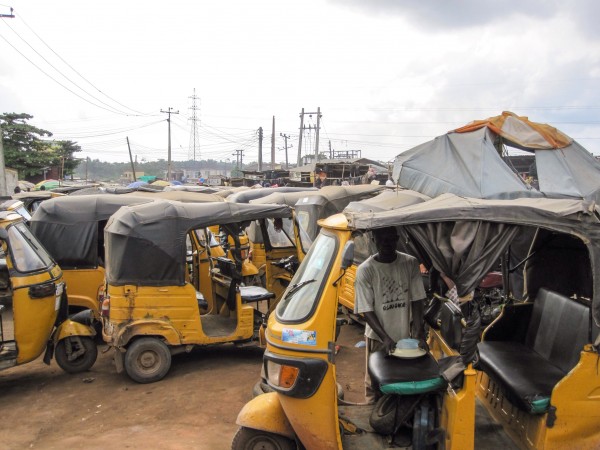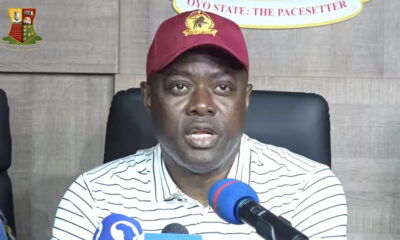Features
Oluwadunsin Deinde-Sanya: Money, Politics & the National Union of Road Transport Workers
The effect of NURTW, especially in places like Lagos, is such that every average Nigerian feels the heat. It is a cycle – agbero harasses transport workers for huge sums of money, transport workers increase the fare in order to meet up with the demand, average Nigerians are forced to cough up the money or trek.
 We had barely moved past 5 bus stops when the agbero stopped our Keke and ordered the driver to step out.
We had barely moved past 5 bus stops when the agbero stopped our Keke and ordered the driver to step out.
“You no wan pay, abi? You no wan pay.” He screamed, his raspy voice cracking as spittle flew off his mouth and splashed into the Keke Napep. I covered my nose and mouth and stared at him. Just like every other agbero I have seen in Lagos, he looked scruffy and rough, his voice gave him away as someone who had spent the most of his time washing his lungs in cannabis and liquor. The few wounds on his face were already turning a nasty shade of green. He grabbed the Keke driver with one blackened hand while using the other to remove the key from the ignition.
The Keke driver was wrong – obviously. Because instead of fighting the agbero back, as some would do, he was smiling sheepishly while trying to scope the agbero to give him more time. “I swear, na now I dey comot, give me till 2 pm”. Like a typical Lagosian, I and the others in the tricycle were running out of patience and we shouted at both the driver and the agbero to settle their palava and let us move. After a few minutes, we were back on the road, “no mind the stupid man, dem no dey work, but na dem dey collect money pass”.
Every day, the Keke Napep driver pays over 1,500 Naira as dues. What they do with the money paid is not publicly known. All the Keke driver knows is that if he doesn’t pay, he won’t be allowed to ride his Keke – one the agberos did not buy for him to start with. Those who ply Yaba to Shitta allegedly pay 2,500 Naira daily.
It was the same story I heard when I took a bike within the Ibeshe-Ebute area of Ikorodu. The bike man had to stop to buy a ticket. The ticket was a pass for him to move and it cost between 200-250 Naira. Within that short journey, he bought the ticket twice – at two different points. For him, the payment does not end there, he told me he had to make a daily payment of 500 Naira. I asked him if he knew what the payment was for, “madam, I no know o, but if I no pay, them go seize my bike and I no go fit work”. I also asked him if, with that money, they have ever helped him in any way. “Help ke? Recently, my bike spoil, na now I gather money repair am. Them never do anything for me. We just dey pay money, we no know wetin dem dey use am do.”
Quick calculation: 1500 × 7(days) × 4(weeks) = 42,000 Naira.
2500 × 7(days) × 4 (weeks) = 70,000 Naira.
In most cases, these Keke and bike riders do not own the vehicles and they have to remit a certain amount of money to the owner, weekly. By the time they remit this money and pay the different agberos that harass them daily, what’s left for them to feed, save, or invest?
As a little kid, I, and every other kid in my church, loved uncle Dotun. Perhaps it was the sweets and chocolates we were sure of getting from him or the way he hung his towel over his left shoulder and had a toothpick between his teeth. He looked rough and always had red or yellow eyes. Still, he was gentle, extremely friendly, easygoing, and never violent in church.
When he died, we cried and mourned him for days and for many years, until we left the church, Dotun was always spoken of. On TV, different factions of the National Union of Road and Transport Workers (NURTW) – where he belonged – had had one of their many clashes which led to a few deaths and left many injured. From the underground gist we got, during the clash, they had tried to butcher Dotun by using a machete, but it hadn’t done any harm, then they tried to gun him down, but the bullets wouldn’t enter his body. After many efforts, they bundled him and threw him into the Lagos Island lagoon. Till today, Dotun’s body was never found.
Many years after, I would later meet Sikirat, whose husband is a member of NURTW and lived in Eko. During their election, he came back home at night bloodied and heavily injured. He had lost to his opposition.
If you ask an average person in Lagos what NURTW means to them – with focus to not just the organisation, but the people in it, few of the words that may pique your interest will be violence, chaos, thuggery, fear, extortion, agberoism and constant clashes between factions.
In January 2020, the Ijesha and Aguda areas of Lagos State were thrown into pandemonium when members of the National Union of Road Transport Workers in the area clashed. NURTW members from Aguda were said to have invaded Ijesha and attacked their rivals in the area around 10pm. They also stabbed one of the members and left him beside a canal close to the scene of the clash.
In March 2020, the NURTW had a clash with the Tricycles Owners Association of Nigeria (TOAN) in Ilorin, Kwara state. This led to the death of the leader of the tricycle owners association, and also left 18 others injured.
In 2011, violence erupted between two factions of the NURTW in some motor parks in Ibadan, Oyo state, and left no fewer than 10 persons seriously injured.
In 2015, 3 people were killed when factions of NURTW clashed in Oshodi, Lagos state.
Just like Nigeria, NURTW, over the years, has been an organisation allegedly backed by dirty politics and corruption. Politically, the NURTW chairman, MC Oluomo – clearly an APC supporter, has been, on many occasions, accused of abetting violence during elections in Lagos.
The effect of NURTW, especially in places like Lagos, is such that every average Nigerian feels the heat. It is a cycle – agbero harasses transport workers for huge sums of money, transport workers increase the fare in order to meet up with the demand, average Nigerians are forced to cough up the money or trek.
For many Lagosians, transportation gulps about 1/3 of their monthly salary and even with the decrease in the price of fuel, the cost of transportation keeps shooting high. What then is the benefit of NURTW if both the transport workers and the passengers are suffering?
With the way many of the NURTW activities are centered on violence, thuggery, and extortion, we all must agree that NURTW is of no benefit to anyone – except the ogas at the top who these monies are remitted to.
If NURTW is a pain in the neck of an average Nigerian, what then is their relevance? Why do they enjoy so much power and monopoly? Why is MC Oluomo being presented as a changemaker and a progressive figure in Lagos State when the union he chairs is notorious for bringing discomfort and hardship to average Nigerians?
In an interview with Funmi Iyanda, MC Oluomo said that Lagos state is digitising commercial participation of motorcycles and Keke Napep. This is hypocritical because just a few months ago, the government clamped down on Gokada and Maxokada – a digitised version of Okada.
MC Oluomo also dispelled the rumours that he’s vying for the position of governorship or any political position. If political seats are not meant for those who propagate violence, thuggery and those who have become a menace to the society, then the discussion of political aspirations should not be held in the first place. Before people are encouraged to fly, we should ensure that they can walk well.
In 2019, Oyo state governor, Seyi Makinde, banned NURTW and the Oyo state government took over the motor parks. While this might not be possible in some states – especially since the union has proved to be an effective political tool, strict regulation is important. There should be conditions for which they ought to operate. The motorists who pay these dues should have something they’re benefiting in return. The passengers who pay these fares should be assured of safe and comfortable rides. The wives of NURTW members should not be scared of losing their spouses during their elections, and the safety of the society should not be threatened by the presence of NURTW.
Simultaneously, we all have the responsibility of ensuring that political seats are not cheapened and taken over by propagators of insurrection and wantonness.





















